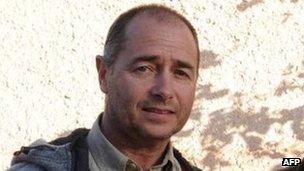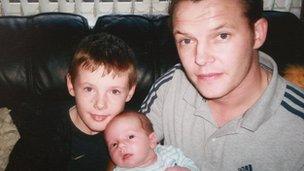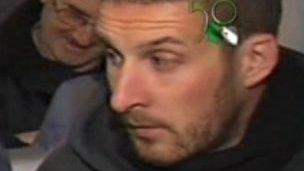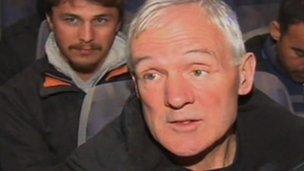Algeria crisis: UK hostages speak of ordeal
- Published
Twenty-two Britons who survived the hostage crisis in Algeria have been arriving back in the UK.
Some of them - or their relatives - have spoken to the media about their experiences and expressed sadness for the colleagues who died.
Allen McCloud, Plymouth

Mr McCloud, 53, is back home in Plymouth. His family told the BBC, through Devon and Cornwall Police, they were glad he was safe "but he has lost some good mates".
His brother, Malcolm, earlier told the BBC the family was "very relieved that Allen is now safe".
"It's been a long, stressful four days for the family," he said.
He was critical of the authorities and BP and Orion for failing to communicate with the family.
"The lack of information from all the relevant sources was very poor. We were kept up to date from friends who worked in the oil and gas industry and the news."
Tony Grisedale, Cumbria
The 60-year-old from Workington told ITV News how he hid for two days without food until he was freed by the Algerian security forces.
He said when he heard the emergency alarm: "I just went back to the accommodation, locked the door, battened down the shutters, knocked the lights off and kept quiet."
He went on: "I had about seven litres of water. There was no food for two days, no telecommunications, no electricity, no running water. So I just lay still and relaxed.
"I made a gameplan for what I'd do if no-one came for me and listened to some music on my phone. I don't know if that was a good or a bad thing to do, as it could have attracted the bad guys. I slept most of the time really.
"There were RPGs and gunfire going on, so that's why I kept out of the way and didn't stick my head out."
Describing the moment he was freed, he said: "I just picked up my bag with my passport in and left everything else. I was escorted out by what looked like their special forces.
"They were very cautious because they didn't know if there were any terrorists around. They got us out quickly and safely."
Alan Wright, Aberdeenshire
Mr Wright, 37, of Portsoy, Aberdeenshire, described his ordeal in detail to Sky News.
He said he was working at the plant when the power went down - a fairly common occurrence.
It was not until they heard sustained gunfire that he and his colleagues decided to hide in an office. They got a satellite telephone, locked the door and stuck pieces of paper to the windows of the room so nobody could see inside.
Escaped hostage Alan Wright: "We're just going to make a run for it"
One of the militants tried to trick workers into giving themselves away, he said, walking past saying "good morning" in a very friendly Arabic voice.
"That was the first moment when we thought we are in big trouble here," he said, but the man walked past, assuming the building had been emptied.
For the next nine hours, the group tried to stay out of sight, not knowing what was happening.
They then left the office for another room, and the foreign workers among the group grew concerned that the Algerian nationals would leave them - and inadvertently betray their position.
Mr Wright phoned home a few hours later to reassure his family, he said, although he was still in grave danger.
He spoke to his wife, declining to speak to his two young daughters as he did not want his last conversation with them to be on a crackly phone.
The next morning, despite initial doubts, Mr Wright went along with a plan by the Algerians to escape. He was given a hat to wear to make him "look less expat" and they cut the wire perimeter fence.
"The first cut of the fence, the wire and tension makes such a noise when it breaks and you knew it travelled to where the terrorists were," he said.
"But within 30 seconds they had both fences open and we were free to go, that was it."
They did not run, fearing to attract attention, and all the while not knowing who were the security forces and who were militants, as the kidnappers had dressed in uniforms.
Relief was mixed with unease, he said.
"We got about a kilometre into the desert and you can see the military point with eight or nine military personnel with guns pointing into our spot but also that they had identified us and were making tracks to come our way.
"Then you think 'Is it the terrorists or is it the gendarmes?' And for 20 minutes you're still not sure - we're down on our hands and knees with our hands up."
The group was then split into Algerians and foreign workers, and Mr Wright thought they had walked into the hands of the militants.
"You fear the worst, you can't put into words how bad you feel, it's something you never want to go through again."
But he was in safe hands, and Mr Wright applauded the courage of his Algerian colleagues in helping the expats escape.
He said: "The guys who had the option to surrender and be safe but decided to stay and help us escape, you'll be in debt to them for the rest of your life."
Iain Strachan, Renfrewshire

Mr Strachan, 38, was among four Britons who briefly spoke to an Algerian television station on Friday. In the interview, he said he was "very relieved to be out".
"Obviously we still don't really know what's happening back on site," he said.
"So, as much as we're glad to be out, our thoughts are with colleagues who are still there at the moment."
He said the Algerian army's assistance was "fantastic".
"I've never been so relieved as when they came and got us off site," he said.
"We thank them very much for that."
Stephen McFaul, Belfast
Mr McFaul, who had travelled to Algeria on an Irish passport, escaped his captors on the second day of the siege.

The 36-year-old was reportedly being transported in a convoy of jeeps in an attempt by the hostage-takers to leave the plant, when Algerian army helicopters fired on them.
The vehicle Stephen McFaul was in crashed, and he managed to escape. At one point explosives were placed around his neck by his captors.
Mr McFaul was reunited with his family on Sunday night in the UK, although not yet home in Northern Ireland.
His 13-year-old son Dylan had said he could not wait to give his father "a big hug".
Darren Matthews, Cleveland

"I am relieved to be going to see friends and family," Darren Matthews, 29, from Saltburn-by-the-Sea, told the Algerian TV station.
"I feel safe at the moment but I won't feel 100% happy until I'm back in the UK, when I am back with my family.
"My heart goes out to the guys that are still there and hopefully everyone comes home safe because, at the end of the day, it's only work. No-one should have to go through that just for a job."
His family said they had been "extremely worried" and were looking forward to having him home.
Martin Johnson, West Yorkshire

Motor engineer Martin Johnson, 62, of Todmorden in West Yorkshire, was freed on Friday.
He said he felt sorry for anybody who had been hurt and paid tribute to his rescuers.
"I think they did a fantastic job. I was very impressed with the Algerian army."
Others
Peter Hunter, 53, from Durham; Lou Fear, 56, from Louth in Lincolnshire; Mark Grant, 29, from Grangemouth, near Falkirk; David Murray, 47, from Kirkby in Merseyside; Huw Edwards, 55, from Macclesfield in Cheshire.